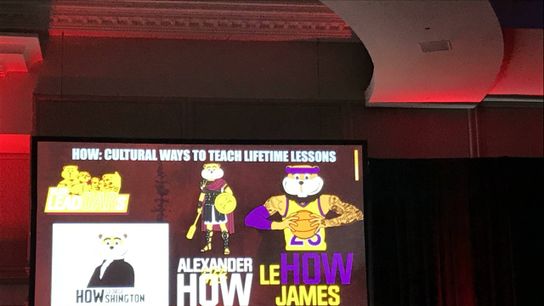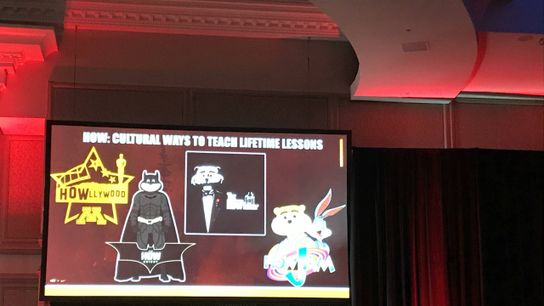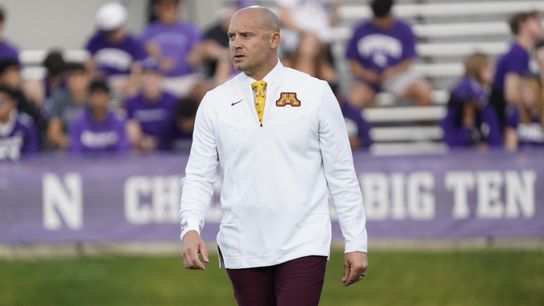If nothing else, credit PJ Fleck for this: he knows how all this plays. The volume, the youth group leader energy, the constant slogan-izing, all of it. "I'm not for everybody," he says.
Nevertheless, in a span of seven seasons Fleck has gone from 1-11 at Western Michigan to 11-2 at Minnesota, and when you accomplish that people tend to notice. And so Fleck opened the AFCA Convention to a crowd of around 5,000 coaches Sunday night in Nashville.
Fleck credited his rise to relentless and unflinching determination to be no one other than himself. "Being yourself is absolutely critical in this profession," he said. "Being yourself makes you stand out, because you're different."
Who Fleck is, according to PJ Fleck himself, is a culture driver. "I am not a motivational speaker. I'm a coach and a teacher. The motivation part comes from the culture," he said.
To understand the Fleck's culture, one must understand one more thing about him: he majored in elementary education at Northern Illinois. Know that, and all of the following will start to make sense.
And so on Sunday night Fleck down his HYPRR culture, which breaks down as follows:
How
Yours
Process
Result
Response
As the creator and enforcer of that culture, Fleck says his job is to get the right people in the building, then connect them as often as possible. "I walk the building 10 to 12 times a day," he said, getting face time with players and also the people who touch his players on a daily basis -- trainers, the equipment room, the cafeteria staff. Fleck also holds team meetings daily and meets with his leadership council weekly. If a locker room toilet is backed up, Fleck wants to know about it.
In addition to getting as much contact with their head coach as possible, Fleck also wants his players to fail, repeatedly. "If you want to be successful, you better fail way more than you succeed," he said. "Failing equals growth, failure equals quit.” As a byproduct of that, Fleck says he prefers to hire coaches who've been fired previously, and encourages them to leave when job offers arrive.
As his career results indicate, Fleck's culture takes three years to install. In fact, his teams actually got worse upon his arrival (from four wins to one at WMU, from nine to five at Minnesota). By year two, they're back to level, and by year three or four they're smashing school records and playing in New Year's Day bowl games. Along the way, WMU's team GPA rose from 2.46 in 2013 to 3.14 in '16, and Minnesota's has risen from 3.07 in 2017 to 3.21 in the fall of 2019.
All of this is part of the plan. In the madness, there is a method.
Each season has a Theme, a Process, and a How. Year 1's theme is "Row and learn", and it's process is Dig, accompanied in Fleck's PowerPoint presentation by a picture of an excavator. In Year 2, the theme is "Rise to maturity" and the process is foundation -- the cultural rot is gone, and now the building process can begin. By Year 3 it's time to "RestOAR," and to build the framework of the house.
The How is where Fleck's elementary education comes in, the part where his college football building might as well become a third grade classroom.
Year 1's How was a fall tour. Excuse me, a fall tOAR.
Year 2's How? Elite leaders.

This year's theme was HOWllywood.

Now, this is the part where we need to take a step back and remind ourselves that just because something works for PJ Fleck doesn't mean it would work for you, or that it would have to work for you, or that there's something wrong with you if you look at a gopher mascot dressed up as Batman with a raised eyebrow. Nick Saban might punch someone in the face if he saw a cartoon Al the Elephant dressed like Prince on the walls of Alabama's facility.
All of that is okay. Your milage may vary on all of the above.
But what is not optional is that every coach at every level is going to have to install his own culture at some point, LeHOW James or not. And at some point, you're going to want some guidance from people who have done it before whether or not your players are picking up what you're putting down.
According to the guy who's done at at two different schools, there are two ways to know whether or not your culture is a healthy one:
1) If your best players are your hardest workers.
2) If the players' voice becomes your voice.
"(Minnesota quarterback) Tanner Morgan is me," Fleck said. "He even looks like me."

"(Western Michigan quarterback) Zach Terrell is PJ Fleck with hair," Fleck said.
"There are three types of teams," Fleck said. "On bad teams, nobody leads. Average teams, coaches lead. Elite teams, players lead."
In closing, Fleck shared the five things he's learned in seven years as a head coach:
1) Never sacrifice what you really want for what you want right now.
2) You have to pay the price of change at some point. When?
3) If you "what" you can be the worker, if you know why and how, you can lead.
4) If your dream doesn't scare you, your dream isn't big enough.
5) (As if there was any doubt) Be you.
